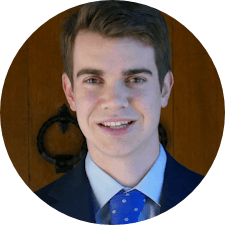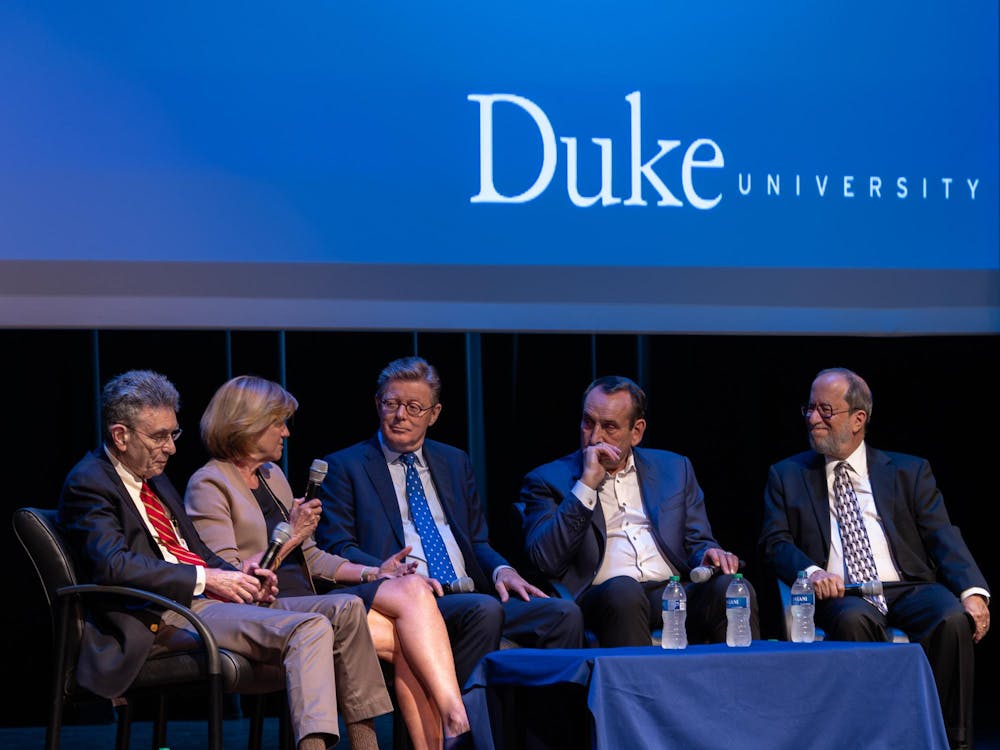Page Auditorium was packed with expertise for a scientific symposium, as seven Nobel prize winners, former Duke men’s basketball coach Mike Krzyzewski and other scientists and administrators shared their research and career experiences on Monday.
The two-day symposium recognized 50 years at Duke for Robert J. Lefkowitz, James B. Duke professor of medicine and winner of the 2012 Nobel Prize in chemistry. In addition to several health research presentations, the symposium featured a dialogue on success with Lefkowitz, Krzyzewski, President Vincent Price and Mary Klotman, executive vice president for health affairs, dean of the School of Medicine and chief academic officer for Duke Health.
“We’re celebrating the life and work of Bob Lefkowitz,” Price told The Chronicle. “He has endowed this University with so much, not just a Nobel Prize, but with a path-breaking laboratory [and] generations of students.”
Topics in the symposium included cholesterol metabolism, stem cells and health research funding.
The Monday afternoon panel, titled “Sustaining Success in the Spotlight,” addressed defining success and responding to failure under scrutiny.
The panel was hosted by Sim Sitkin, the Michael W. Krzyzewski University distinguished professor in leadership at the Fuqua School of Business. By nature of its guests, the conversation made frequent parallels between leadership in the sciences, academia and sports.
Lefkowitz began the discussion by framing success as action. He made a lighthearted reference to baseball legend Yogi Berra’s quote, “How can you think and hit at the same time?”
He added that he takes inspiration from John F. Kennedy’s definition of happiness, inspired by Aristotle, viewing it as the “full use of your powers along the line of excellence.”
Krzyzewski defined success as accomplishing a goal in a personally fulfilling way. “I believe that you should define your own success,” he said. “We will set our standards, and we will go after them.”
The panelists also discussed the role of failure, agreeing that it is central to success.
Krzyzewski characterized his response to failure in four steps: self-belief, attitude adjustment, reflection and execution of what was learned.
“Failure is not a destination,” he said. “You get up, or you let someone else help you get up. In other words, you form a team.”
Klotman described failure from the perspective of a scientist.
“Failure is absolutely required in science,” she said. “It’s learning from an experiment that tells you how to learn from the next experiment.”
Another key topic of the panel conversation was how to sustain success in the public eye, and Krzyzewski emphasized the importance of using a platform for good.
Throughout his career, Krzyzewski has engaged in a wide range of philanthropic activities. He founded the Emily Krzyzewski Center, a community center that seeks to inspire economically disadvantaged youth to “reach their highest potential as future citizen leaders.” Among his other service efforts are projects for The Jimmy V Foundation for Cancer Research and Duke Children’s Hospital.
“The spotlight usually represents more than you,” he said. “So then how do you use it?”
Price believes that allowing others to succeed by sharing a platform can be gratifying, and he advocated for fostering a culture of honesty in which people can be “critical of one another in a healthy way.”
At the end of the panel, audience members asked questions about making difficult decisions, such as when to pivot away from a research topic. Lefkowitz pointed to the value of mentorship in these situations.
“This is quintessentially … the kind of thing you can learn from a mentor,” Lefkowitz said. “You spend several years working with them, you will invariably see them face that situation.”
Price told The Chronicle about the impact he felt the symposium could have on the Duke community.
“What we’re hoping from this panel is that people would be able to understand the different ways they can lead, that there are leadership roles and opportunities everywhere,” Price said. “With the kinds of students we have at Duke, I have no doubt that our students will take full advantage.”
Hanlin Wang contributed reporting.
Get The Chronicle straight to your inbox
Signup for our weekly newsletter. Cancel at any time.

Michael Austin is a Trinity sophomore and managing editor of The Chronicle's 120th volume.

